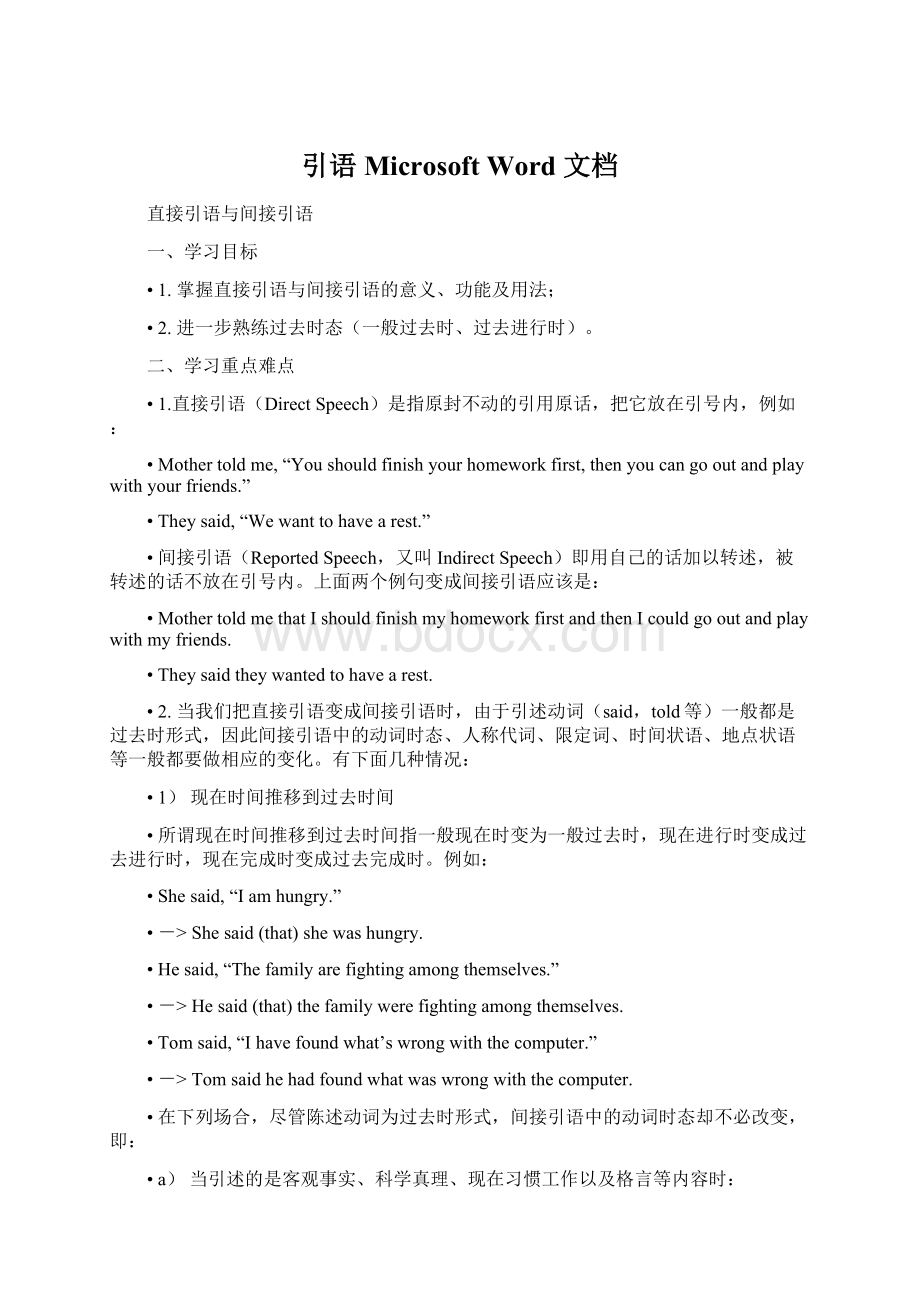引语Microsoft Word 文档Word文件下载.docx
《引语Microsoft Word 文档Word文件下载.docx》由会员分享,可在线阅读,更多相关《引语Microsoft Word 文档Word文件下载.docx(8页珍藏版)》请在冰豆网上搜索。

•Hesaid,“Thefamilyarefightingamongthemselves.”
Hesaid(that)thefamilywerefightingamongthemselves.
•Tomsaid,“Ihavefoundwhat’swrongwiththecomputer.”
Tomsaidhehadfoundwhatwaswrongwiththecomputer.
•在下列场合,尽管陈述动词为过去时形式,间接引语中的动词时态却不必改变,即:
•a)当引述的是客观事实、科学真理、现在习惯工作以及格言等内容时:
•Hesaid,“Theword‘laser’isanacronym(首字母缩略词).”
Hesaidtheword‘laser’isanacronym.
•b)当动词所表示的状态或动作在引述时仍在继续时:
•“I’mforty,”hesaid.
Hesaidheisforty.
•c)当谓语动词包含无过去时形式的情态助动词时:
•Hesaid,“Itmustbeprettylate.Ireallymustgo.”
Hesaiditmustbeprettylate,andhereallymustgo.
•Hesaid,“Youmustn’tsmokeintheroom.”
HesaidImustn’tsmokeintheroom.
•2)过去时间推移到过去的过去
•这里需要注意以下几点:
•a)当强调动作或状态先于引述动词时,一般过去时要变成过去完成体。
•Hesaid,“Ididn’tknowyou.”
Hesaidhehadn’tknownme.
•当“过去的过去”已经不言自明,或者通过其他词汇手段予以体现,或者侧重于强调所转述的事实本身时,一般过去时形式可以不变。
•Annsaid,“Shewasbornin1981.”
•->
Annsaidshewasbornin1981.
•b)过去进行时可以变成过去完成进行时,也可以不变。
•Robertsaid,“IwasjokingwithMary.”
RobertsaidhehadbeenjokingwithMary.
•RobertsaidhewasjokingwithMary.
•c)过去完成时仍为过去完成时,不需改变。
•Hesaid,“Wehadn’treturnedtothestorewhenshecame.”
Hesaidtheyhadn’treturnedtothestorewhenshecame.
•d)时间状语分句中的一般过去式或者过去进行时可以不变。
•Johnsaid,“WhenIlivedinLondonIoftensawJane.”
JohnsaidwhenhelivedinLondonhehadoftenseenJane.
•JohnsaidwhenhelivedinLondonheoftensawJane.
•3)将来时间推移到过去将来时间
•最常见的是把表示将来时间的助动词由现在时形式变为过去时形式。
•Hesaid,“We’respendingnextweekendathome.”
Hesaidtheywerespendingthenextweekendathome.
•Shesaid,“Themilkwillgooff(变质)ifyoudon’tdrinkittoday.”
ShesaidthemilkwouldgooffifIdidn’tdrinkitthatday.
•Theysaid,“We’regoingtoHawaiithissummervacation.”
TheysaidtheyweregoingtoHawaiithatsummervacation.
•但是,在引述时,如果原话中的动作或者状态属于尚未到来的将来时间,那么,可以不推移到过去将来时间。
•Hesaid,“I’llbewaitingforyoutomorrow.”
Hesaidhewillbewaitingformetomorrow.
•4)人称代词、限定词、时间状语、地点状语的变化
•由上面的例子可以看出,当直接引语变成间接引语时,除动词时态变化外,人称代词、限定词、时间状语、地点状语等通常也作相应的变化。
•a)人称代词,除引述本人原话外,通常第一、二人称变为第三人称,或者第二人称变为第一人称;
限定词也作相应的变化。
•Hesaid,“Weloveourcountry.”
Hesaidtheylovetheircounty.
•b)指示代词this,these分别变成that/it,those/they或them;
指示限定词this,those通常变为that,those或the。
•“Thishouseisveryexpensive,”shesaid.
Shesaidthathousewasveryexpensive.
•Thechildrencamebackwithtwowalletsandsaid,“Wepickedtheseuponthepavement.”
Thechildrencamebackwithtwowalletsandsaidtheyhadpickedthemuponthepavement.
•c)时间状语在间接引语中的变化有三种情况:
•i)时间状语和动词时态两者都变。
•Hesaid,“Itwascompletesayearago.”
Hesaidithadbeencompletedayearbefore.
•ii)时间状语不变,动词时态可变可不变。
•Shesaid,“WeleftParisat8a.m.”
ShesaidtheyhadleftParisat8a.m.
•ShesaidtheyleftParisat8a.m.
•iii)时间状语变与不变需视具体情况而定,如果引述时间和说话时间(如同一年、同一月、同一天等),时间状语可不变。
•Mr.Blacksaid,“WestartedlearningChineselastmonth.”
Mr.BlacksaidtheyhadstartedlearningChineselastmonth.(同一月引述)
Mr.BlacksaidtheyhadstartedlearningChinesethepreviousmonth.(可在同一月引述,也可不在同一月引述)
•直接引语间接引语
•todaythatday
•thismorning/afternoon,etc.thatmorning/afternoon,etc.
•yesterdaythedaybefore,thepreviousday
•(the)daybeforeyesterdaytwodaysbefore
•tomorrowthenextday,thefollowingday
•(the)dayaftertomorrowtwodaysafter,intwodays’time
•nextweek/month,etc.thenextweek/month,etc.
•lastweek/monththeweek/monthbefore
•nowthen
•d)地点状语here通常变为there;
但若说话人所在地也就是引述人所在地,可仍用here,也可用具体地点代替here。
•Shesaid,“Ifirstmetyourbrotherhere.”
Shesaidshefirstmetmybrotherthere.
•“Arethechildrenhere?
”Fatherasked.
Fatheraskedwhetherthechildrenwerehere.
•本单元重点:
直接引语和间接引语,需要注意的是:
直接引语变间接引语时,人称和时态要发生变化,时态得和主句的时态保持一致。
•Sentencesfromthepassage(重点句讲解)
•Iaskedherwhyshewantedtodothat,andshesaidthatshehadforgottentodohers.
•我问她为什么要那么做,她说她忘记做作业了。
•forgettodosth.忘记做某事(还没有做)
•forgetdoingsth.忘记做过某事(已经做过了)
•e.g.Whenyouleavetheclassroom,don’tforgettoturnoffthelights.
•离开教室时,别忘记关灯。
•Iforgotmeetinghimbefore.我不记得以前见过他了。
•类似的还有:
•remembertodosth.记得做某事(还没有做)
•rememberdoingsth.记得做过某事(已经做过了)
•e.g.
•“Remembertofinishyourhomeworkontime,LiMing”,hismothersaid.
•李明妈妈说,“记得按时完成作业。
”
•Iremembertellingthisstoryforseveraltimes.
•我记得这个故事给你讲过好几次了。
•◆IsaidIdidn’tthinkitwasagoodideaforhertocopymyhomework.
•我说,抄我的作业并不是什么好事。
•注意的think用法:
如果think引导的宾语从句,其从句表示否定意思时,不是否定从句,而是否定主句。
•e.g.翻译下列句子:
•我认为给你父亲说这件事的时机还不成熟。
•Idon’tthinkitistherighttimeforyoutotellyourfatheraboutthat.
•我认为他不是一个好演员。
Idon’tthinkheisagoodactor.
•我认为你说的并不正确。
Idon’tthinkyouareright.
•◆Yesterdayshetoldmeshewassorryshe’dgottenmad.
•昨天她告诉我,她为自己当时生气而抱歉。
•◆Nowadays,manystudentspreferusingEnglishnamesinalanguageclassroom.
•如今,许多学生喜欢在上语言课的时候用英文名字。
•prefer的用法:
preferv.更喜欢;
宁愿
•prefersth.tosth.喜欢…胜过…
•preferdoingsth.todoingsth.喜欢…而不喜欢…
•prefertodoratherthando宁愿…而不愿…
•Doyouprefercoffeeortea?
你喜欢咖啡还是茶?
•Hepreferstalkingtodoing.他喜欢说,却不喜欢做。
•Theyprefertodieratherthansurrender.他们宁死不屈。
•◆Andforyoungpeople,havinganEnglishnameiscoolforthemwhentheytalktotheirforeignpenpals.
•而且对年轻人来说,有了英文名字,和笔友交谈时也很酷。
•havinganEnglishname…中having是动词ing形式,用来做主语。
•Gettingupearlyeverydayishisgoodhabit.每天早起是他的习惯。
•Swimmingisherfavoritesport.游泳是她最喜欢的运动。
•◆LearningEnglishandhavingEnglishnamesarebothpopularinChina.TheyarealsoimportantforChina’scontactwiththeworld.
•学习英语,而且有英文名字在中国很流行。
这些对中国和世界的接触也很重要。
•contact的用法:
•contactn.
•e.g.beincontactwith和...接触,有联系
•Theyhavebeenincontactwitheachotherforfiveyears.
•他们互相保持联系已经有五年了。
•Shecomesintocontactwithmanypeople.她和许多人有联系。
•contactv.
•e.g.Shecontactedmeassoonasshearrived.她一到就和我联系了。
•◆Ontheotherhand,somepeoplewhocometoChinachooseChinesenames
•另一方面,一些人来到中国,也起了中文名字。
•ontheonehand一方面…
•ontheotherhand另一方面…
•Ononehand,heisacleverboy;
ontheotherhand,healwaysmakeshismotherangry.
•一方面,他是个聪明的孩子;
可另一方面,他老惹母亲生气。
一、将直接引语变成间接引语
•1.Theplumbersaid,“Ican’tfixthebathtubtodaybecauseI’msick”
•Theplumbersaidhecouldn’tfixthebathtubthatdaybecausehewassick.
•2.Grandmasaid,“Grandpaisfeelingmuchbettertoday.”
•GrandmasaidGrandpawasfeelingmuchbetterthatday.
•3.Mr.andMrs.Davissaid,“Wewon’tbeabletocometodinnerthisSaturdaynight.”
•Mr.andMrs.Davissaidtheywouldn’tbeabletocometodinnerthatSaturdaynight.
•4.Thelandlordsaid,“Ihaven’treceivedthismonth’srentyet.”
•Thelandlordsaidhehadn’treceivedthatmonth’srentyet.
•5.CousinSuesaid,“I’msorryIdidn’thavetimetocomeoverandvisitlastSaturday.”
•CousinSuesaidshewassorryshehadn’thadtimetocomeoverandvisitthepreviousSaturday
•6.UncleHarrysaid,“I’llcallbacklater.”
•UncleHarrysaidhewouldcallbacklater.
•7.Theneighborsacrossthestreetsaid,“Wewererobbedlastnight!
•Theneighboracrossthestreetsaidtheyhadbeenrobbedthenightbefore.
•8.Sallysaid,“I’matmyfriendJuliet’shousenow.”
•SallysaidshewasatherfriendJuliet’shousethen.
•9.Mothersaid,“Yoursisterandbrother-in-lawaregoingtohaveababy.”
•Mothersaidmysisterandbrother-in-lawweregoingtohaveababy.
•10.Auntysaid,“Therewasabigfireatthehighschool.”
•Auntysaidtherehadbeenabigfireatthehighschool.
二、用第三人称转述下面电子邮件
1.Subject:
Mother’sDay
InItalywecelebratetheMother’sdayonthe2ndSundayofMay,that’swhystudentsdon’tgotoschoolandadultsarenotatwork.Sonsanddaughtersusuallygivetheirmotheralittlepresentlikeflowers,chocolatesorapieceofcostumejewelry.
ElisabettafromItaly
•1.ElisabethfromItalysaidinItalytheycelebratedtheMother’sDayonthe2ndSundayofMay,andthatwaswhystudentsdidn’tgotoschoolandadultswerenotatwork.Shesaidsonsanddaughtersusuallygavetheirmotheralittlepresentlikeflowers,chocolatesorapieceofcostumejewelry.
2.Subject:
Father’sDay
IbelieveFather’sDayoccursonthethirdSundayofJune.Weuseittogiveourfathersachancetorestandrelax,anddothingstheyenjoy,suchasfishing,golf,etc.Theyneedabreak!
UsuallymyfamilywillbuyDadacard,takehimtoeatandplay.
FromtheUnitedStatesbyMelissa
•2.MelissafromtheUnitedStatessaidshebelievedFather’sDayoccurredonthethirdSundayofJune.Shesaidtheyusedittogivetheirfathersachancetorestandrelax,andtodothingstheyenjoy,suchasfishing,golf,etc.Shesaidtheyneededarest.
•Melissaalsosaidusuallyherfamilywouldbuyherfatheracard